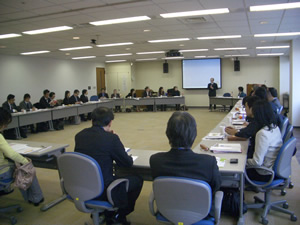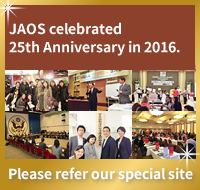Activity report
2009 Fiscal Year 12th Annual JAOS-FGER Meeting
February 12, 2010
at AIG Training Center in Kinshicho

For the 13th time, JAOS and FGER (Foreign Government Educational Representatives) met for a lively exchange of information. Both sides presented their sides of the study abroad equation and discussed study abroad trends. This year, the meeting took a new approach, with JAOS presenting results from the 2nd survey (conducted in the autumn of 2009) done in collaboration with FELCA (Federation of Education and Language Consultant Associations) and GAELA (Global Alliance of Education and Language Associations) member organizations. FELCA is a London-based international association made up of about 1,000 study abroad industry organizations while GAELA represents about 2,000 language schools through national language school associations. This world-scale survey is groundbreaking in that it is the first to combine information from both agencies (FELCA) and schools (GAELA). As a first attempt, the results of this survey were unable to clearly confirm detailed market trends due to things such as a lack of survey items and sample size. However, the shear amount data does give us a great reference for understanding general international study abroad trends. Through this research, we were able to confirm our assertion that the current outbound situation in Japan is rather grim. By comparing 2008 figures recently released by the Japanese Ministry of Education, Culture, Sports, Science and Technology with those from a similar survey done in 2006, it has also come to our attention that the number of Japanese high schoolers studying abroad for more than three months has declined by 20% in 2 years. To address this, the embassies of various nations offered opinions regarding cooperative activities that might help invigorate the Japanese outbound study abroad market. For example, the Ireland Governmental Bureau for Business Affairs proposed that an educational tour of Ireland be organized for JAOS member organizations. In total 53 individuals attended the meeting, including 40 participants from 30 different JAOS member organizations, 12 representatives from FGER bodies (U.S. Embassy, Japan-U.S. Educational Committee, Australian Governmental Organization for International Education, Ireland Governmental Bureau for Business Affairs, British Council, Canadian Embassy) and one observer.


